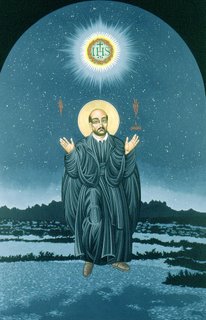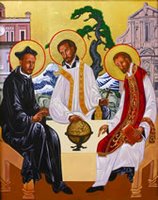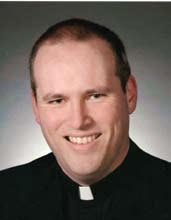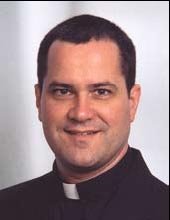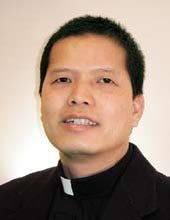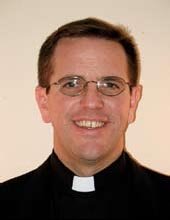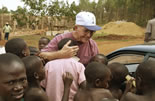Before I joined the Jesuits I met regularly with a Jesuit who lived nearby in South Carolina. Knowing my interests in literature and writing, he often spoke of a great Jesuit he hoped that I would soon meet. He sensed that I had something in common with Fr. Tom Stahel, ho had spent many years working as an editor at America magazine. My mentor and I traveled to the Jesuit ordinations at Spring Hill College that year. One of the first things he did was to try to introduce me to Tom. My first impression wasn't the best. Looking back, I think Tom tried to be as gracious as possible, but the truth was that he was in a hurry to get somewhere. Besides, Tom was never a master of the social graces. My first years as a Jesuit I had only the occasional encounter with Tom, as he was serving as the novice master in Nigeria. But, eventually, he returned to province and I soon learned that he indeed was a kind and gracious man. He had not forgotten my mentor's attempt to get us connected and so, when I saw him, he took an active interest in the work, studies or writing that I was doing. I could always count on him to be interested when often others were not.
Because of my positive experience with Tom (save for that first encounter), I wondered at the fact that many men in my province still harbored an active dislike and even hostility toward Tom. The reason was that at 39 years old, Tom had been called upon to be provincial, during a particularly difficult time for the province. Some hard decisions had to be made, some institutions had to be closed, and some never forgave him for those decisions. I suspect also that some of this had to do with the way in which Tom handled these things because first, he was pretty young to be provincial, and second, like I said, he was not always a master of the social graces.
But the years in which I knew Tom were lived heroically. He no doubt knew of the contempt that some in the province had for him, but he never spoke of it or complained about it. Upon his return from Nigeria, he answered the call to be assistant and admonitor to the provincial, a particularly trying job in recent years, as part of his responsibility was to handle accusations of abuse against Jesuits in the province. When he finally got a break from that, he was asked to take over as pastor of both of New Orleans' Jesuit parishes, a big job that would involve stresses that were different, but comparable in degree to his previous job. That was when he began to suffer from what at first just seemed like Bell's palsy, a paralysis of one side of the face which is often merely temporary. It lasted well over a year and began to affect bothe his eyesight and his speech. Yet, he continued his work through it all. Eventually, it became clear that there was more wrong than just the palsy, and he was relieved of his pastoral duties to seek treatment in New York. An exploratory surgery revealed nothing. But, when he began to have difficulty swallowing, the doctors eventually identified a cancer which radiation treatments were not able to cure him of. He spent a brief time at the
America Jesuit community, a place he loved and had hoped to go back to work eventually. But soon he had to return to New Orleans where he could be better cared for.
I saw Tom just a few weeks before he died. He was never a large man, but I was shocked to see how frail he had become. He could barely speak, but took my hand with uncharacteristic affection. He sat with the community and seemed to draw a little energy from listening to our conversation. When I spoke of things that I'd been doing, he continued to show that interest which had buoyed me in years past, and seemed pleased to hear of my progress. He got up to leave, having expended all his energy listening. I hardly knew what to say, but embraced him again and just said, "Good to see you."
This all came back, with some tears, as I saw his name in
the most recent issue of America. In "Christ, Come Quickly," Tom speaks of others he had accompanied in death, and what it's like for him to now be the one who is dying. Heroic to the end, he offered this last reflection, though he could barely even write:
Others have been here before me, after all. Think of those soldiers in the movie “Saving Private Ryan,” aboard landing boats at Normandy. They knew ahead of time that like soldiers everywhere, some of them would be blown to bits. Or think of Philip Evans, an English Jesuit who was told he was to be hanged the next day. At the time (the date was July 20, 1679), Philip was playing tennis. He continued his game. As they prepared to execute him, he proclaimed it was the best bully pulpit he ever had. St. Philip (he is a martyr saint), pray for me.
So what does it feel like to die?
It feels like a slackening of powers and a tendency to fall like a ragdoll. I cannot swallow, have not been able to for months now. That is the worst of it, although for some time I have been deaf and blind on the right-hand side. Doing anything on the right is difficult—so that writing now is like what left-hand writing used to be. Down to 118 pounds, I move at night with caution; though if I fell, I would not make much of an impression.
Talking is more and more difficult, and this is confirmed by others’ having more and more difficulty understanding my guttural attempts at speech. God never closes one door without opening another, they say. So all this has been felt as numbness, not pain, though doctors warn that pain may come. Who would have thought that dying felt like midmorning and midday exhaustion? Well, perhaps one who has had more experience than I. But in any case, just to be left alone to sleep seems a great blessing. The doctor recommends that I speak with the oncologist. But even to speak with him requires paperwork that I can do only with difficulty—hence, I rely on the kindness of a Jesuit superior who will do it for me.
Such is the quality, or non-quality, of life these days that I am like the nun in Gerard Manley Hopkins’s poem “The Wreck of the Deutschland,” crying out: “O Christ, Christ come quickly.”At Tom's funeral mass, Fr. Leo O'Donovan quoted one American provincial who said, "Tom was a good man who was easy to find when you needed a good man."
These words ring so true to me as both the tragedy and the triumph of this great Jesuit's life.
